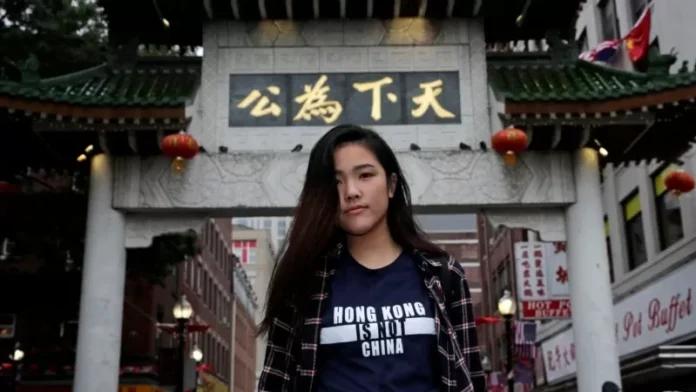BOSTON, MASSACHUSETTS — Two exiled Hong Kong activists, Anna Kwok and Frances Hui, are facing unprecedented challenges as they continue their advocacy work from the safety of the United States. Last year, the Hong Kong government imposed bounties on them and several others for their alleged violation of the controversial national security law.
Kwok, who became the executive director of the Washington-based Hong Kong Democracy Council in November 2022, was mentally prepared for potential retaliation from the Hong Kong government. However, the reality of the bounties and arrest warrants issued against her and seven others on July 3, 2023, still came as a shock. Hui, who serves as the policy and advocacy coordinator for the U.S.-based Committee for Freedom in Hong Kong Foundation, was one of an additional five who had bounties imposed on them in December.
The 13 activists are accused of endangering national security by violating the national security law that went into effect in Hong Kong in July 2020. The severity of the situation has caused both Hui and Kwok to fear for their safety and the well-being of their families.
Hui described the experience as “jarring and shocking,” while Kwok shared that she didn’t realize the full implications of the bounties until her bank account in Hong Kong was frozen. “At first, I was surprised for only 10 seconds and immediately went into work mode, thinking about how to use this incident to advance our advocacy agenda in media interviews,” said Kwok. But when she checked her Hong Kong bank account on the night of July 3, 2023, she realized the real-life impact of the bounties on her.
Hong Kong authorities have justified their actions by stating that these activists have “betrayed their country” and continue to “endanger national security” even while living abroad. However, Eric Lai, a research fellow at Georgetown University’s Center for Asian Law, believes that the Hong Kong government’s motives go beyond punishing the activists. “It’s a silencing tactic to both people around the bounty holders and the bounty holders themselves,” he said, adding that it is part of the government’s larger efforts to surveil, harass, and intimidate political dissidents in exile.
The bounties and arrest warrants are not the only measures taken by the Hong Kong government to suppress dissent. Last month, they also canceled the passports of several overseas activists, and in the U.K., three men were charged with spying on members of the Hong Kong diaspora community on behalf of the Hong Kong intelligence service.
Apart from targeting the activists themselves, the Hong Kong authorities have also interrogated their family members, causing them to feel a sense of guilt and responsibility for their loved ones’ safety. “It’s a very lonely experience to know that whatever I do could be connected to people who are associated with me,” said Hui. “But I also know that if I stop my activism now, that’s exactly what the Chinese Communist Party would want, to intimidate and silence me.”
In addition to the emotional toll, the bounties have also increased the fear for the activists’ safety. Hui shared that she has become extra cautious about talking to people, even those within the Hong Kong diaspora community. Kwok, on the other hand, has received death threats and messages of physical harm, causing her to fear for her life. “It’s not just about me anymore; it’s about my family, my friends, and anyone associated with me,” she said.
Despite the fear and anxiety, Hui and Kwok remain determined to continue their advocacy work and speak up for those who have been imprisoned in Hong Kong. Hui believes that her personal experience shows the need for stronger protection mechanisms against transnational repression. “There are still many gaps in implementing these mechanisms in many countries,” she said, adding that the Hong Kong government’s actions have damaged trust within the diaspora community.
The Hong Kong government, however, stands by its actions, stating that the extraterritorial effect of the national security law is in line with international law and common practices adopted by several countries. They have also warned that absconders will be held accountable for their actions and face criminal liability, regardless of their location.
For now, Hui and Kwok continue to live in fear but remain committed to their mission of advocating for democracy and freedom in Hong Kong.

